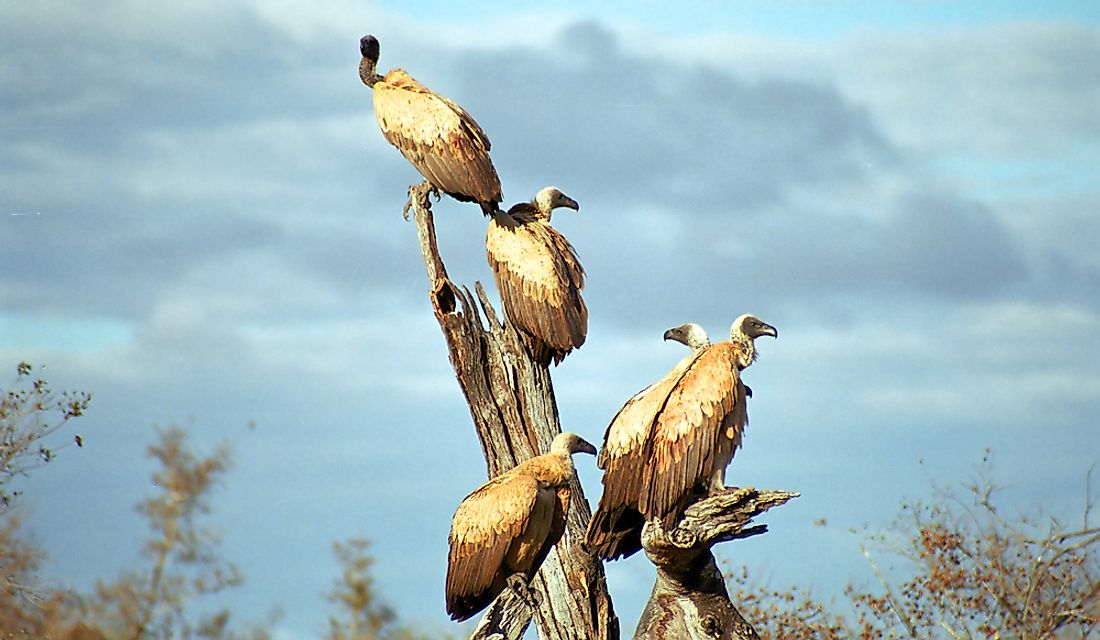Why Are African Vultures Dying?

Vultures are scavenger birds that search the ground for animal carcasses to eat. These carcasses are usually left over from other predators and therefore easier for the bird to tear apart and eat. Most of these birds have a feather-free or nearly feather-free head and a large, hooked beak which helps them tear into flesh. The vulture species located in Africa are called Old World vultures, and there are 11 species on the continent. Of these, six are endangered. They are White-Headed Vulture, White-Backed Vulture, Hooded Vulture, Ruppell’s Vulture, Lappet-Faced Vulture, and Cape Vulture. The reasons these particular vultures are endangered is discussed below.
Reasons for Declining Population
Vulture species are threatened by human activity. Their deaths have been directly related to actions taken by humans, either targeting these birds specifically or as a result of other events. The decline in vulture populations has been drastic and is already leaving an evident environmental impact. Vultures are vital to healthy ecosystems, their scavenging helps prevent the spread of disease by ridding communities of rotting carcasses.
Poisoning
The number 1 reason that African vulture populations are declining is due to poisoning. An estimated 61% of all deaths have been attributed to poison. They are being poisoned both indirectly and directly. Indirectly, they are caught in an ongoing struggle between people and land predators. Predators eat livestock, and so herders have been leaving out poisoned carcasses to kill animals such as lions and jackals. Vultures then come to clean up the leftovers, suffering the same fate as the predators before them. In addition, poachers are directly responsible for poisoning these birds. When vultures swarm around elephant and rhino carcasses, law enforcement officials are able to locate poaching activity. So these illegal hunters leave poisoned meat behind to kill off the birds so their activity can go undetected.
Use In Traditional Medicine
The second greatest threat to African vultures is their use in traditional medicine. This reason is responsible for 29% of all vulture deaths. In many African cultures, people believe that death, disease, and sickness are caused by spiritual activity and the only way to counter it is through the use of traditional healers. The high cost of pharmaceutical drugs also pushes people to traditional medicine which is not as expensive. Vultures are believed to provide clairvoyance and increased intelligence. Hunters shoot, trap, or poison these birds on both protected and unprotected lands. Estimates suggest that between 4,000 and 6,000 vultures are killed or traded annually, of these, anywhere from 1,341 to 2,011 are considered endangered.
Electrocution
Another cause of vulture deaths is by electrocution. Roughly 9% of these birds are killed by electrical infrastructure throughout the continent. Experts explain that this is because vultures are extremely large birds with heavy bodies and long wingspans, which leads to their increased risk of electrocution. They fly through treeless environments (like savannas) and use electrical poles as resting points, often flying into the lines. Additionally, their food sources are often found in higher quantities near electrical lines. The majority of power lines throughout Africa were built prior to environmental impact assessments and do not have “bird-friendly” functionality.
Food Source
The other contributing factor to vulture deaths is that they are a food source for some rural populations. This fact is not as significant of a problem as the aforementioned factors and causes around 1% of vulture losses. Although, hunting these birds has been increasing over recent years. This rise in hunting is due to a loss of traditionally consumed animals throughout African nations. As a result, hunters are turning to birds. In research visits to markets within 12 countries, 52 different vulture species were found in meat stalls. Of these, approximately 25% are endangered.
What Is Being Done?
The current number of deaths must be reduced to save the vulture species and protect the fragile ecosystems of which they form a part. Many non-governmental organizations are working with local governments to achieve this goal. They are creating educational campaigns to target consumers, creating new policies to regulate vulture trade, and increasing research of vultures. Additionally, some organizations have been working to update power lines with insulated transformers and bird flight diverters. Other efforts are being made to conserve traditional meat sources and their habitats to protect vultures from becoming bushmeat.
Why Are African Vultures Dying?
| Rank | Threat | % share of vulture deaths |
|---|---|---|
| 1 | Poisoning | 61% |
| 2 | Trade in traditional medicines | 29% |
| 3 | Electrical infrastructures | 9% |
| 4 | Killing for food | 1% |







